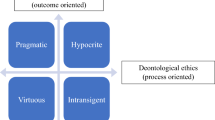Abstract
Modern liberal theories share the idea that the state and its laws should remain neutral with respect to the varying conceptions of the good life held by individuals. This article discusses the way in which this notion of neutrality is defined and justified. Rawls's theory of justice is shown to be a prime example of such a theory. Questions are raised, however, if Rawls's theory has adequately formulated the conditions that would make it possible for each citizen to fulfill his own conception of the good. After arguing that Dworkin's solution to this problem is also problematic, it is argued that Sen's solution to the question of what conditions create neutrality shows the way ahead.
Similar content being viewed by others
References
Ackerman, B. A. (1980).Social Justice in the Liberal State, Yale University Press, New Haven, CT.
Ackerman, B. A. (1983). What is neutral about neutrality?Ethics 93: 372–390.
Alexander, L., and Schwarzschild, M. (1987). Liberalism, neutrality, and equality of welfare vs. equality of resources.Philos. Public Affairs 16: 85–110.
Arneson, R. J. (1987). Meaningful work and market socialism.Ethics 97: 517–545.
Arneson, R. J. (1989). Equality and equal opportunity of welfare.Philos. Stud. 56: 77–93.
Barry, B. (1990a).Political Argument; A Reissue with a New Introduction University of California Press, Berkeley, Los Angeles.
Barry, B. (1990b). How not to defend liberal institutions.Br. J. Polit. Sci. 20: 1–14.
De Marneffe, P. (1989).Liberalism and Education. Unpublished Doctoral thesis, Department of Philosophy, Harvard University.
De Marneffe, P. (1990). Liberalism, liberty, and neutrality.Philos. Public Affairs 19: 253–274.
Dworkin, R. (1977).Taking Rights Seriously Gerald Duckworth, London, UK.
Dworkin, R. (1978). Liberalism. In Hampshire, S. (ed.)Public and Private Morality, Cambridge University Press, Cambridge, UK, pp. 113–143.
Dworkin, R. (1981a). What is equality? Part 1: Equality of welfare.Philos. Public Affairs 10: 185–246.
Dworkin, R. (1981b). What is equality? Part 2: Equality of resources.Philos. Public Affairs 10: 283–345.
Dworkin, R. (1983). Neutrality, equality, and liberalism. In Maclean D., and Mills, C. (eds.),Liberalism Reconsidered, Rowman and Allanheld, Totowa, NJ., pp. 1–11.
Fishkin, J. S. (1975). Justice and rationality: Some objections to the central argument in Rawls's theory.Am. Polit. Sci. Rev. 69: 615–629.
Galston, W. (1982). Defending liberalism.Am. Polit. Sci. Rev. 76: 621–629.
Gutmann, A. (1985). Communitarian critics of liberalism.Philos. Public Affairs 14: 308–322.
Jones, P. (1989). The ideal of the neutral state. In Goodin, R. E. and Reeve, A. (eds.),Liberal Neutrality, Routledge, London, pp. 9–38.
Kymlicka, W. (1988). Liberalism and communitarianism,Can. J. Philos. 18: 181–204.
Larmore, C. E. (1987).Patterns of Moral Complexity Cambridge University Press, Cambridge, UK.
Mouffe, C. (1988). Rawls: Political philosophy without politics.Philosophy 13: 105–123.
Nagel, T. (1975). Rawls on justice. In Daniels, N. (ed.),Reading Rawls Basil Blackwell, Oxford, pp. 1–15.
Nagel, T. (1987). Moral conflict and political legitimacy.Philos. Public Affairs 16: 215–240.
Rawls, J. (1971).A Theory of Justice Harvard University Press, Cambridge, MA.
Rawls, J. (1980). Kantian constructivism in moral theory.J. Philos. 77: 515–572.
Rawls, J. (1982). Social unity and primary goods. In Sen, A., and B. Williams, B. (eds.),Utilitarianism and Beyond Cambridge University Press, Cambridge, pp. 159–185.
Rawls, J. (1985). Justice as fairness: political not metaphysical.Philos. Public Affairs 14: 223–251.
Rawls, J. (1987). The idea of an overlapping consensus.Oxford J. Legal Stud. 7: 1–25.
Rawls, J. (1988). The priority of right and ideas of the good.Philos. Public Affairs 17: 251–276.
Rawls, J. (1989). The domain of the political and overlapping consensus.NY Univ. Law Rev. 64: 233–255.
Raz, J. (1986).The Morality of Freedom, Oxford.
Richardson, H. S. (1990). The problem of liberalism and the good. In Douglass, R. B. Mara, G. M., and Richardson, H. S. (eds.),Liberalism and the Good Routledge, New York, pp. 1–28.
Roemer, J. E. (1985). Equality of talent.Econ. Philos. 1: 151–187.
Roemer, J. E. (1986). Equality of resources implies equality of welfare.Quart. J. Econ. C1: 751–784.
Rorty, R. (1988). The priority of democracy to philosophy. InThe Virginia Statute Religious for Freedom; Its Evolution and Consequences in American History Cambridge University Press, Cambridge, pp. 257–282.
Sandel, M. (1982).Liberalism and the limits of justice Cambridge University Press, New York.
Sandel, M. (1984). Morality and the liberal ideal.The New Republic. May 7: 15–17.
Scanlon, T. (1986). Equality of resources and equality of welfare: A forced marriage?Ethics 97: 111–118.
Schwartz, A. (1975). Moral neutrality and primary goods.Ethics 83: 294–307.
Sen, A. (1982a). Rights and agency.Philos. Public Affairs 11: 3–39.
Sen, A. (1982b). Equality of what? In Sen, A. (ed.),Choice, Welfare and Measurement Clarendon Press, Oxford, pp. 353–369.
Sen, A. (1984). Rights and capabilities. In Sen, A. (ed.),Resources, Values and Development Harvard University Press, Oxford, pp. 307–324.
Sen, A. (1985a). Well-being, agency and freedom.J. Philos. 82: 169–221.
Sen, A. (1985b).Commodities and Capabilities North-Holland, Amsterdam, The Netherlands.
Sen, A. (1987).The Standard of Living Cambridge University Press, Cambridge.
Sen, A. (1988). Freedom of choice.Eur. Econ. Rev. 32: 269–294.
Sen, A. (1989).The Territory of Justice, Harvard Institute of Economic Research; Discussion Paper 1425, Harvard University, Cambridge, MA.
Sen, A. (1990). Justice: Means versus freedom.Philos. Public Affairs 19: 111–121.
Taylor, C. (1989). Cross-purposes: The liberal-communitarian debate. In Rosenblum, N. L. (ed.),Liberalism and the Moral Life Harvard University Press, Cambridge, MA, pp. 159–182.
Thigpen, R. B., and Downing, L. A. (1987). Liberalism and the communitarian critique.Am. J. Polit. Sci. 31: 637–655.
Varian, H. R. (1985). Dworkin on equality of resources.Econ. Philos. 1: 110–125.
Wallach, J. R. (1987). Liberals, communitarians, and the task of political theory.Polit. Theory 15: 581–611.
Author information
Authors and Affiliations
Rights and permissions
About this article
Cite this article
Lehning, P.B. Liberalism and capabilities: Theories of justice and the neutral state. Soc Just Res 4, 187–213 (1990). https://doi.org/10.1007/BF01048397
Issue Date:
DOI: https://doi.org/10.1007/BF01048397




